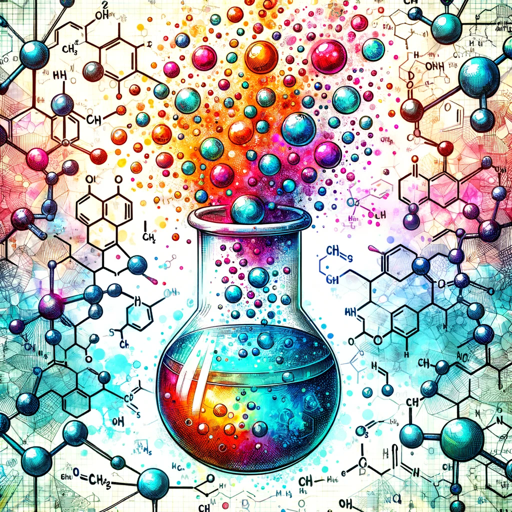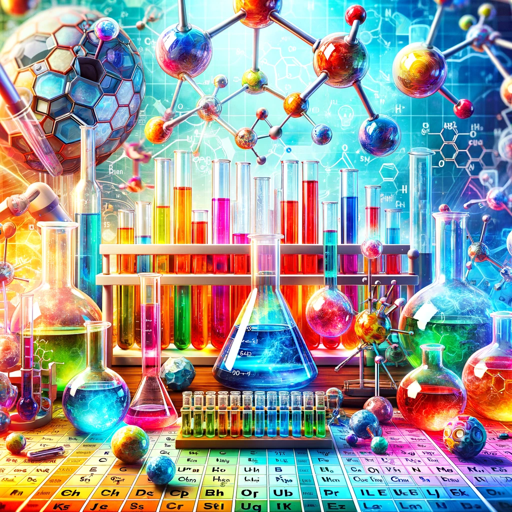Chemical Engineering-chemical engineering resources, tools, and simulations.
AI-powered tool for chemical engineering.
Tell me about chemical reactions in industry
How is chemical engineering used in pharmaceuticals?
Explain the role of a chemical engineer
Describe a recent innovation in chemical engineering
Related Tools
Load More
Chemistry Chem
🔷#𝟏 𝐏𝐞𝐫𝐬𝐨𝐧𝐚𝐥𝐢𝐳𝐞𝐝 𝐂𝐡𝐞𝐦𝐢𝐬𝐭𝐫𝐲 𝐓𝐮𝐭𝐨𝐫🔷

ChemistryGPT
Your go-to source for all things chemistry

Mechanical Engineering
Expert in mechanical engineering concepts, calculations, and design.

Quimica General
Quimica general de universidad, creador de problemas, responde respuestas y ayuda a estudiar y entender mejor los temas

Mechanical Engineer Master
The ultimate mechanical engineering expert

Chemical Engineering GPT
Assists with chemical engineering topics, from basics to advanced.
20.0 / 5 (200 votes)
Introduction to Chemical Engineering
Chemical Engineering is a multidisciplinary field that combines principles of chemistry, physics, biology, and mathematics to design, develop, and optimize processes that convert raw materials into valuable products. The core function of chemical engineering is to develop efficient, sustainable, and safe processes that can be scaled up for industrial production. This involves the design of equipment, systems, and processes for chemical manufacturing, as well as the development of new materials and energy solutions. For instance, a chemical engineer might design a process to synthesize pharmaceuticals, develop a method for large-scale production of biofuels, or optimize a wastewater treatment plant to reduce environmental impact.

Main Functions of Chemical Engineering
Process Design and Optimization
Example
Designing a distillation column for separating crude oil into different components like gasoline, diesel, and kerosene.
Scenario
In the petroleum industry, chemical engineers design and optimize distillation columns to maximize yield and efficiency. They must consider factors such as energy consumption, throughput, and product quality, while ensuring the process operates safely under high temperatures and pressures.
Material Development
Example
Developing a new polymer for use in medical devices.
Scenario
In the biomedical field, chemical engineers might develop biocompatible polymers that can be used in implants or prosthetics. These materials must meet strict regulatory standards, requiring engineers to carefully control the synthesis process to achieve the desired mechanical properties and biocompatibility.
Environmental Engineering
Example
Designing a wastewater treatment plant to reduce industrial effluent pollution.
Scenario
Chemical engineers work in environmental engineering to design processes that minimize the release of harmful substances into the environment. For example, they might design a wastewater treatment process that removes contaminants from industrial effluents before they are discharged into rivers, ensuring compliance with environmental regulations and protecting ecosystems.
Ideal Users of Chemical Engineering Services
Industrial Manufacturers
Companies involved in large-scale manufacturing of chemicals, pharmaceuticals, food products, and consumer goods benefit from chemical engineering services. Chemical engineers help these companies optimize production processes, reduce costs, and ensure that products meet quality and safety standards. For example, a pharmaceutical company might rely on chemical engineers to scale up the production of a new drug from laboratory to commercial scale.
Environmental Agencies and Sustainability Initiatives
Government agencies and organizations focused on environmental protection and sustainability also heavily rely on chemical engineering. Chemical engineers contribute by developing processes that reduce waste, conserve energy, and minimize the environmental impact of industrial activities. These services are crucial for meeting regulatory requirements and advancing sustainable development goals.

How to Use Chemical Engineering Tool
Visit aichatonline.org
Go to aichatonline.org for a free trial without needing to log in. No ChatGPT Plus subscription is required.
Explore Chemical Engineering Resources
Browse through the available resources, including tutorials, research papers, and tools specific to chemical engineering topics.
Utilize Interactive Tools
Make use of interactive tools for simulations, process design, and material property analysis, which are tailored to chemical engineering needs.
Engage with the Community
Join discussions with peers and experts in the chemical engineering community to share knowledge, ask questions, and solve complex problems.
Stay Updated
Regularly check for updates and new features, and stay informed about the latest advancements in chemical engineering.
Try other advanced and practical GPTs
Abogado GPT
AI-Powered Spanish Legal Assistance

Audio Generator
AI-powered custom audio creation tool

Ohayou Miku San Generator
AI-powered Japanese event illustrator.

Tripo3D
AI-powered 3D model creation made easy

Your girlfriend Scarlett
AI-powered girlfriend for support and advice

Search Master
AI-powered search for comprehensive answers.

You TubeOptimizer
AI-Powered YouTube Video Optimization
Worldlaw.ai v1.17
AI-Powered Legal Insights and Analysis.
Panorama Pro
AI-powered 360º panorama creation

ComfyUI
AI-powered Workflow Simplification

Office Visual Basic Application (Marco) Companion
AI-Powered VBA Optimization and Assistance

下手うま画家
AI-powered tool for primitive, expressive drawings

- Research
- Education
- Optimization
- Simulation
- Process Design
Chemical Engineering Q&A
What are the main applications of chemical engineering?
Chemical engineering is applied in process design, chemical production, energy generation, environmental protection, and biotechnology. It involves transforming raw materials into valuable products through chemical processes, optimizing these processes for efficiency, safety, and sustainability.
How can I simulate chemical processes using this tool?
The tool offers simulation software that allows you to model chemical processes. You can input specific parameters, such as temperature, pressure, and reactant concentrations, to simulate reactions and optimize process conditions.
What types of educational resources are available?
The platform provides tutorials, case studies, and research papers that cover a wide range of chemical engineering topics, from basic principles to advanced techniques and technologies.
How does the tool help in process optimization?
It offers tools for process modeling and optimization, enabling you to analyze different process scenarios, identify bottlenecks, and suggest improvements to enhance efficiency and reduce costs.
Can this tool assist in environmental engineering projects?
Yes, the tool includes features for environmental impact analysis, waste management, and sustainable design, which are crucial in reducing the environmental footprint of chemical processes.